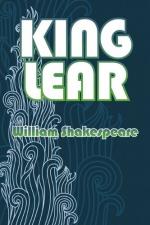|
This section contains 5,345 words (approx. 18 pages at 300 words per page) |

|
SOURCE: "Earthly Doom and Heavenly Thunder: Judgement in King Lear," in University of Dayton Review, Vol. 23, No. 2, Spring, 1995, pp. 63-71.
In the following essay, Green discusses the workings of legal and divine judgment in King Lear.
In King Lear (1605-1606) Shakespeare refers to the law and to judgment, both secular and divine, again and again, heightening the pressure and force of the tragic outcome. The repeated legal situations, rather than offering hope of a fair judicial decision or a merciful reprieve, intensify and mirror the characters' experiences of heavenly wrath, human cruelty, and hopeless pain.
It is illuminating to recapitulate as much as possible the ways in which Shakespeare's audience might have perceived these situations, concentrating on what Shakespeare might reasonably have expected the ordinary playgoer to know and understand. Almost certainly this ordinary playgoer had not read all the contemporary materials which modern critics have perused—nor...
|
This section contains 5,345 words (approx. 18 pages at 300 words per page) |

|


